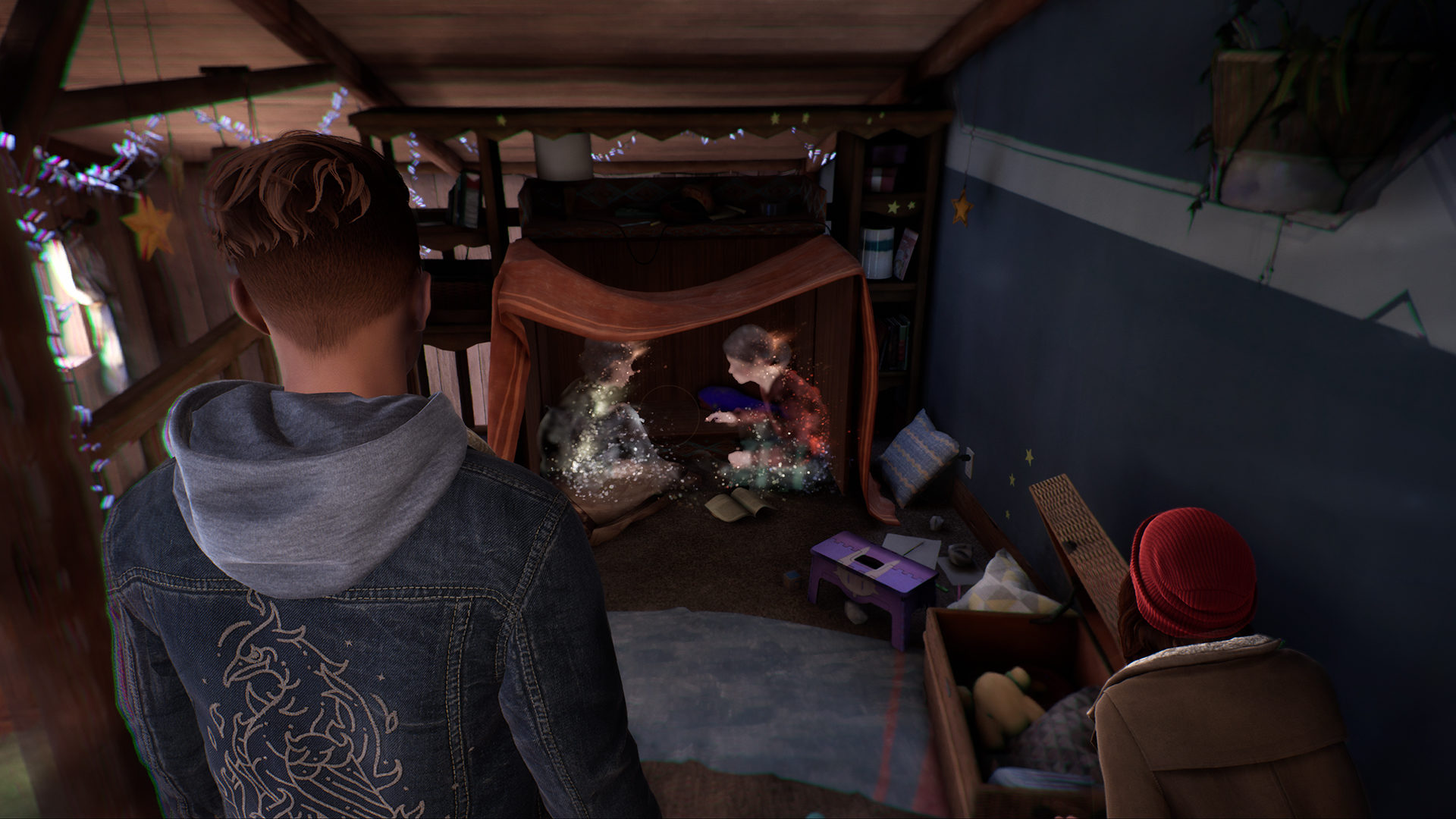At first glance, I wondered why Tell Me Why wasn’t called Life is Strange 3. Here were character driven-drama, supernatural elements, and an indie folk soundtrack, set in a small town with too many secrets—all signature elements of the series that put Dontnod on the map.
Then I remembered: Oh yeah, this game isn’t published by Square Enix.
But beyond that superficial reality, for all its apparent similarities to Life is Strange, Tell Me Why is a much quieter game than its predecessors. Dontnod’s previous serials have plenty of introspection, but they also have action-packed, borderline pulpy moments of, say, a character tied to a chair in a serial killer’s basement or a standoff in the middle of a burning church.
The conflict in Dontnod’s latest game, by comparison, is almost entirely internal, and the investigation that drives the story is more about the characters reconfiguring their collective understanding of the past than it is about solving an ongoing problem. The result is a game that’s just as emotionally poignant as the Life is Strange series, but maybe lacking in standout moments and the kinds of cliffhangers that make the wait for the next episode nearly unbearable.
Tell Me Why follows 21-year-old twins Tyler and Alyson Ronan following Tyler’s release from a juvenile rehabilitation center, where he was sent after he apparently killed their mother, Mary-Ann, in self-defense. Shortly after reuniting and returning to their hometown of Delos Crossing, Alaska, to sell their old house, the Ronan siblings discover that they have the ability to conjure memories that they collectively share, which complements another ability they’ve had since they were children that lets them talk to each other telepathically. The Ronans have dubbed this power “the Voice,” and though it’s not as fantastical as Max’s ability to turn back time or Daniel’s telekinesis, it does once again provide the main thrust of the narrative.

As with the Life is Strange series, the emotional core in Tell Me Why comes from the relationship between the two main characters. Tyler and Alyson haven’t seen each other in 10 years; while the first seven years of distance were court-mandated, the last three were due more to Tyler’s own need to work on his self-acceptance while he started testosterone therapy as a transgender man. This decade-long absence of the twins in each other’s lives provides a lot of the main emotional conflict early on: Tyler blames Alyson’s adopted father, Delos Crossing police chief Eddy Brown, for initially breaking them up, while Alyson feels conflicted about her brother keeping his distance for the last three years. On the one hand, Alyson—who’s grown up in Delos Crossing and made a life for herself there—understands that Tyler needed that time to become his own person, but she’s still hurt that he didn’t trust her to be a part of that process.
Still, the bulk of the game follows the twins as they try to piece together what happened to their mother on that night. They both remember she had a shotgun and wanted to kill Tyler, but many questions still remain. Why did Mary-Ann want to kill Tyler, and why is the rest of the town so keen on forgetting the past?
Tell Me Why is an emotionally complex game, certainly on the same level as either Life is Strange. While Max, Chloe, Daniel, and Sean were all forced to deal with traumatic circumstances in their present moments, Tyler and Alyson dig up memories that were buried, albeit in shallow graves. It asks interesting, challenging questions about the reliability of memory and how much we can know people, especially as children, when our memories are both foundational to our psychological makeup and inherently imperfect.
One of Tell Me Why’s more refreshing qualities is how it handles Tyler’s story. It’s hard to talk about how Tyler’s identity as a transgender man impacts the narrative without going into early-game spoilers, but the short answer is that it really doesn’t. (However, you might want to skp the following paragraph if you want to fully avoid spoilers.)
Dontnod made it abundantly clear through supplemental material that accompanied the review copy of the game that it didn’t want to fall into the normal narrative traps of portraying the experiences of transgender characters. Namely, it didn’t want Tyler’s identity to either be rooted in trauma or to be the excuse for future trauma. Still, it’s troubling that Tyler and Alyson had both believed, at the beginning of the game, that the reason that Mary-Ann wanted to kill Tyler was because, at the age of 11, Tyler cut his hair short, one of his first acts of transitioning. The twins believing for a decade that their mother was transphobic (an idea that’s quickly debunked in the game’s first chapter) certainly left some kind of mark on the characters and had to have informed Tyler’s identity and journey of self-acceptance to some degree.
Truthfully, I don’t feel entirely qualified or comfortable speaking to how “right” or “wrong” Dontnod got Tyler’s experience. I do think that the beginning of the game makes the studio’s statements seem a bit hypocritical. However, I think that Dontnod redeems itself throughout the course of the game. Yes, Tyler’s identity as a trans man is important to him, as it should be, but it’s also just one aspect of his personality. He’s also adventurous, fearless, pushy, and fiercely loyal to his sister. The story also doesn’t revolve around Tyler’s gender identity. Its main focus is on the twins, their relationship, and their shared past. It’s about the challenges they face in reconnecting after a decade apart, all while trying to uncover what truly happened the night their mother died.

While Tell Me Why is just as emotionally rich as Dontnod’s previous titles, it does feel much thinner in terms of the actual mechanics. Sure, the scope of the game is much smaller than either Life is Strange game, which works for the story the studio is telling, but that unfortunately translates to the gameplay as well.
As I said before, the twins’ Voice and their ability to reconstruct memories play a pivotal role in the story, and they share some superficial similarities to Daniel’s telekinesis and Max’s ability to manipulate time. But the way that Dontnod utilizes these abilities is much more mundane than in its previous games.
An interesting moment early on is when the twins use their Voice in the middle of a conversation with another character to silently communicate. However, these moments only pop up a handful of times, and they seemingly don’t impact the results of the conversation in a player-controlled way. You do have the choice to ignore the Voice, but even when engaging it, I didn’t feel like the results of any of the conversations I had would have been different.
The same goes for moments when Tyler and Alyson have different memories of the same incident. Though the accumulative choices you make over the course of Tell Me Why’s three chapters might impact a single moment near the end of the story, the game never really explains how this works—unlike in Life is Strange 2 where you know that the example that Sean sets for Daniel will have a very real impact on what happens.
Even the dialogue choices you make throughout the game seem relatively inconsequential in the story’s grand scheme. It’s true that Dontnod’s games generally guide you in a singular direction, no matter what choices you make. Even still, Tell Me Why’s dialogue decisions seem mundane, especially compared to Life is Strange’s biggest moments like trying to talk down Kate in the first game or the explosive conclusion of the sequel’s third chapter. Yes, certain characters may feel differently about other characters depending on the decisions you make here, but these feelings don’t necessarily translate directly to the plot.
Maybe that makes Tell Me Why seem like a “lesser” game than Dontnod’s previous efforts, but I think it’s better to think of it as (intentionally) smaller in scope and more domestic in its preoccupations. As it stands, there isn’t another developer that brings its characters to life in the same intimate way that Dontnod does. The tiny details, the detritus of their lives, make Alyson and Tyler just as real as Max, Chloe, Sean, and Daniel. No, Alyson and Tyler’s story didn’t have me on the edge of my seat the same way that either Life is Strange game did, but it did give me time to reflect on my own sense of memory, my own assumptions. How many games do that?

|
★★★★☆
Tell Me Why might be smaller in scope and less mechanically complex than Dontnod’s Life is Strange series, but it’s just as emotionally impactful. It’s a compelling story with relatable, complex characters, and yet another example of Dontnod’s unbeaten ability to make players feel something, anything, in a medium that’s increasingly more mind-numbing. |
Developer Dontnod Entertainment Publisher Xbox Game Studios ESRB M - Mature Release Date 08.27.20 |
| Tell Me Why is available on Xbox One and PC. Primary version played was for Xbox One X. Product was provided by Xbox Game Studios for the benefit of this coverage. EGM reviews on a scale of one to five stars. | |

Michael Goroff has written and edited for EGM since 2017. You can follow him on Twitter @gogogoroff.
